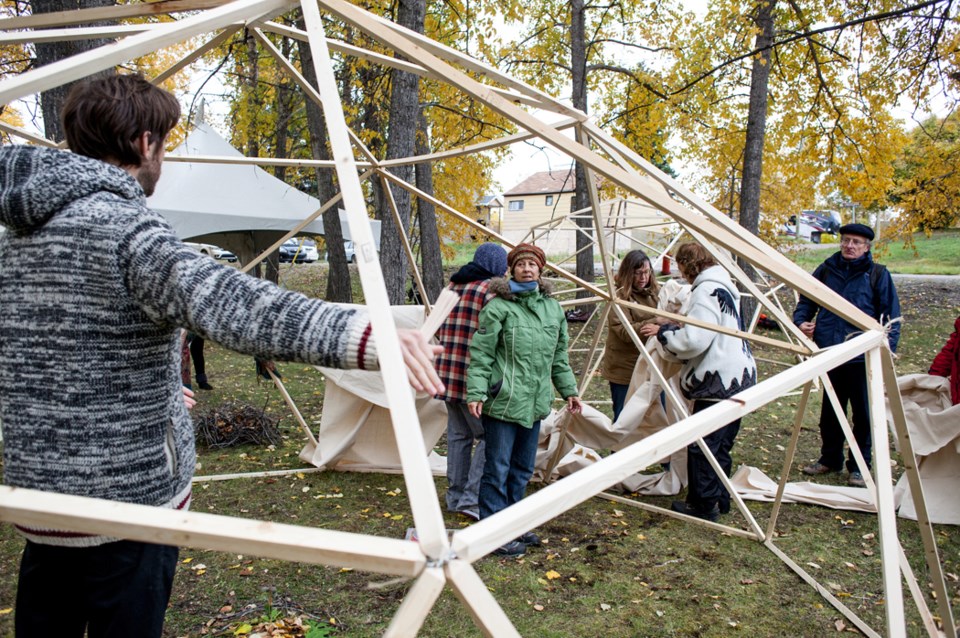It’s been more than a month since the North Central Canada Centre for Arts and Environment (NCCCAE) hosted its pilot project – the Building Knowledge Course – but the information shared in the course is timeless.
The course saw 13 students learn from instructors who travelled from across the country and abroad.
“We looked at our sense of place throughout this week – art and environment and geometry, with sense of space,” said Crystal Kolt, chair of the Flin Flon Arts Council. She explained the group delved into local history, both ancient and more modern, through geology, geometry, architecture and heritage studies.
The pilot project came out of a discussion organized by Kolt for the Flin Flon Arts Council in Winnipeg in May. At the meeting was a representative from Prince’s Charities Canada, which supports Canadian charitable work of the Prince of Wales.
“We had a conversation about who we are and what each of us does in terms of heritage in the community,” said Kolt, reflecting she was nervous presenting in front of a number of representatives of Canadian universities, but remembered some words of wisdom from her daughter: “We accomplish great things at a high level. We are confident at bringing things to a high level and we know how to build something from zero to a high level.”
The Building Knowledge course was held in Flin Flon at the end of September. It included instructors such as Pat Bruderer, who practises birch bark biting, and Jon Allen, an architect based out of London, England.
As a practising architect, Allen was interested in the correlation between geometry and indigenous teachings.
“A key ingredient of the Building Knowledge Course was the involvement of local indigenous elders, and I was particularly delighted to find that there were so many commonalities between their wisdom and the geometry that I teach,” said Allen.
“In both traditions, the beginning is a circle. For example, a traditional Cree meeting would be held in a circle, and ceremonial activities would be done in a circular fashion. Similarly, when we draw a geometric construction, the first act is to draw a circle, and this remains a reference for the rest of the construction.”
Allen was also attracted to the hands-on approach of the Building Knowledge Course.
“They key is as much as possible to learn about things by doing them, rather than just hearing about them.”
Ben Wride, who grew up near Flin Flon and holds a bachelor of arts in international development studies addressed course participants on the resiliency of indigenous people.
“Changing the mindset of seeing someone who is in a bad way as ‘Wow, you’re a survivor. You’ve been through a lot and somehow you’re still here.’ That flips the paradigm … that changes it from kind of a scoffing position of self-righteousness to commanding some amount of respect,” Wride told the The Reminder.
“If you change viewing indigenous people as being incredibly resilient, then that totally flips it, and you’re on a pretty good track. People don’t even have to be all gung ho to help, and be an activist. Just not being racist is good enough, and then I think a lot of stuff gets taken care of on its own.”
Kolt said the pilot project was a good learning experience for the organization.
“What happened here – it’s really hard to convey how big of a deal it was these people came,” she said.
“These people made an amazing commitment. This was all so novel – we had a chance to really figure this out and learn, so when they come again we’ll be in a better position to really convey or relax into what we want to demonstrate.”
The NCCCAE has been in the works for the last seven years, and Kolt said the committee already has ideas for a second educational series.
“We want to start a course for learning traditional building skills. That’s the next phase – we’re hoping to have a three week course,” said Kolt.
“We know where we are, and we know there are many more questions to ask.”
For more information on the NCCCAE, visit its website at www.ncccae.ca.




